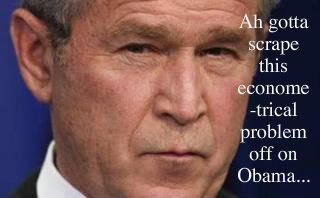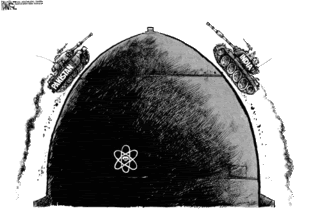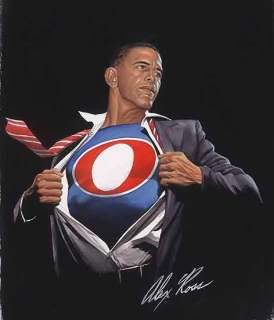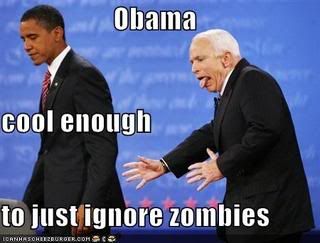Saturday, January 17, 2009
Wednesday, January 14, 2009
Tuesday, January 13, 2009
They laid down for Bush without complaint
And just why on earth are they doing this? (my bold)House Republicans are determined to oppose the release of the second half of the financial-industry bailout funds, a GOP House leadership aide tells the Huffington Post.
House Minority Whip Eric Cantor (R-VA) will work to persuade members to vote to oppose releasing the funds -- an enviable task, considering the unpopularity of the bailout.
The Republican conference position makes approval of the release of the funds difficult for Speaker Nancy Pelosi (D-CA) and other House Democrats, many of whom opposed the original dispersal.
On Monday, Boehner announced that he would be personally opposing the release of the rest of the funds, though he stopped short of calling on his colleagues to do the same. "I remain disappointed about the way TARP has been managed and how its resources have been spent over the last several months. From the outset, the program has been implemented with too little transparency and in a manner inconsistent with the way it was presented to Congress last fall. Until officials can present a clear plan to Congress -- and, most importantly, to taxpayers -- demonstrating how the expenditure of additional TARP funds will benefit our economy and making clear an exit strategy for getting the government back out of the private sector, it would be irresponsible for Congress to release the remainder of these resources. I will oppose the release of these taxpayer funds when the matter is considered on the House floor," Boehner said.Oh, nice try guys! But you supported Bush and his neocon buddies for eight solid years, you own this economic disaster.
The unpopular bailout has only become less popular over the last few months, as banks and the Treasury Department have refused to reveal details as to how the taxpayer money -- or, more accurately, future taxpayers' money -- has been spent.
Republican opposition, however, is a political freebie: the president will still get the money. He can veto congressional disapproval of the funds; House Democrats then need only 144 votes to sustain such a veto and authorize the money's release without any Republican consent. If they do, however, they may earn the sole political ownership of the bailout they fought so hard to avoid.

Blog sprinkles

United States needs to renounce its neocon arrogance and realize that being a superpower doesn't automatically give us leadership rights. The world community has passed us by and we now need to make sure our nation just survives. Distributorcap says it best.
Obama drifting to the right? Mustang Bobby of Bark Bark Woof Woof reassures us with a poem.
Bush's last presser.
The sabotage of Condi Rice.
Dear Mr. Obama. Remember your promises. Especially to Hecate's grandson.
Don't let the door hit you on the way out, George.
(found via scoutprime at First Draft)
Steve Bates of the Yellow Doggerel Democrat threatens us with Carbon Neutral Balls.
Blue Girl of They Gave Us a Republic talks about the decimation of the CDC during the Bush era:
Julie Gerberding, the wingnut Bushie who has driven the CDC into the ground is out come January 20. Rumor had it that she wanted to stay on, but so eager to get rid of her they are, that she isn't even being retained until a replacement is selected and confirmed. Instead, CDC chief operating officer Bill Gimson will be acting director in the interim.Putting the public at risk because of political ideology? Wait.. that's the entire Bush administration.A statement from the transition team didn't go into too much detail, stating simply that "As part of the transition process, the administration requested resignation letters from a number of senior-level officials, including Dr. Julie Gerberding. This week, the administration accepted Dr. Gerberding's resignation, effective January 20. As Dr. Gerberding noted in a November e-mail to CDC leadership, she has always expected that she would be leaving after the administration changes."
Gerberding took the helm of the CDC seven years ago, after the anthrax attacks, and immediately set about decimating it, ignoring science and changing the structure to one where she micromanaged everything, even things that were far outside her lane and incapacitating the agencies ability to respond in the event of a public health crisis.
Chet Scoville of Vanity Press on Joe the Plumber.
Bryan of Why Now? mentions the pragmatism of FDR:
In a way, the strength of FDR was that he didn’t have a grand strategy that everything was part of, and nothing was ignored because of the side that proposed it. There was a goal, getting out of the Depression, and if you had an idea that might help, it was tried. If it worked, it was kept. If it didn’t work, it was gone.Seems that Obama may have that same pragmatic streak...
Hoover was a conservative, so he had already tried the conservative policies, which is why there weren’t many tried by FDR. He did back off the big stimulus packages after about 4 years to get the budget under control, but when the economy faltered, he went back to what he knew worked.
If we are going to get out of this mess, people are going to have to cut loose from their preconceived notions and go with programs that have a track record. FDR found a lot of things that worked and this is no time to reinvent the wheel - wait too long and there may be no wagon to put it on or horse to pull it.
Monday, January 12, 2009
America does not torture.
Digby of Hullabaloo:
They've just successfully moved the goalposts. We are now engaged in a battle to persuade Obama that he must unequivocally and publicly disavow what those two jaded, decadent sadists just suggested was necessary lest he risk Americans being killed. Good luck to us on that. Considering Obama's propensity for consensus, I would guess that he will find some way to appease them. (Maybe he'll vow to make sure that the torturers don't enjoy it, as a sop to the liberal freaks.)
But I would suggest that Obama contemplate one little thing before he decides to try to find "middle ground" on torture. It is a trap. If he continues to torture in any way or even tacitly agrees to allow it in certain circumstances, the intelligence community will make sure it is leaked. They want protection from both parties and there is no better way to do it than to implicate Obama. And the result of that will be to destroy his foreign policy.
If the man who represents the second chance this country's been given around the world to repudiate the horrors of the Bush years is revealed to have perpetuated the same horrors, his credibility and foreign policy will be in shambles. And there are many people buried in the intelligence and military establishments who would be happy to make sure that happens.
Saturday, January 03, 2009
Friday, December 26, 2008
Shouldn't this be a huge red alert?

You know: Hair on fire, claxon alarms, shrieks, the clattering of hundreds of shoes as diplomats rush to planes to talk these two countries down?
Pakistan Moves Thousands Of Troops Toward Indian BorderBecause... you know... both countries have nukes? Hello Bush administration? The article continues:
The troops headed to the Indian border were being diverted away from tribal areas near Afghanistan, officials said, and the move was expected to frustrate the United States, which has been pushing Pakistan to step up its fight against al-Qaida and Taliban militants near the Afghan border.Wait ... surely Bush must be on it!
Two intelligence officials said the army's 14th Division was being redeployed to the towns of Kasur and Sialkot, close to the Indian border. They said some 20,000 troops were on the move. Earlier Friday, a security official said all troop leave had been canceled.
The officials spoke on condition of anonymity because of the sensitivity of the situation.
Both countries have said they want to avoid military conflict over the attacks. But India has not ruled out the use of force as it presses its neighbor to crack down on the Pakistani-based terrorist group it blames for the attack.
The United States has urged India and Pakistan to avoid unnecessarily raising tension amid reports of troop movements to the border.What? This standoff could start WWIII (or is it IV?). Do we have anyone going over there? Like... you know... Rice? Anybody? Did Bush fire the entire diplomatic corps? And what does it mean: the US is in close contact? What does that mean? On the phone? IMing? Email? Why do I think nobody's home .....?
[snip]Air strikes against militants in the restive Swat and Bajaur regions had been scaled down as some of the airpower had to be redeployed to the country's eastern border, a senior Pakistani military official told Asif Farooqi, the Islamabad-based correspondent of the BBC Urdu service.
There have been reports of possible forthcoming "surgical" strikes by India on the headquarters and camps of Lashkar-e-Taiba, the militant group India blames for the Mumbai attacks.
The group and Pakistan's government deny any involvement.
White House spokesman Gordon Johndroe said: "We hope that both sides will avoid taking steps that will unnecessarily raise tensions during these already tense times."
He said the US remained "in close contact with both countries to urge closer co-operation in investigating the Mumbai attacks and in fighting terrorism generally".
The BBC's Barbara Plett in Islamabad says the troop movements do not appear to be greatly significant and that both countries have said they want to avoid military conflict. However they warn they will act if provoked.
But our correspondent says any significant cut in the Pakistani military presence along the Afghan border would worry Washington, which relies on Islamabad to stem cross-border Taleban attacks on Nato forces.
President-elect Obama?
OoOoohhhhhhHHh boy.... January 20th can't come fast enough...Dec. 12, 2008 | A consensus is emerging among intelligence analysts and pundits that Pakistan may be President-elect Barack Obama's greatest policy challenge. A base for terrorist groups, the country has a fragile new civilian government and a long history of military coups. The dramatic attack on Mumbai by members of the Pakistan-based Lashkar-e Tayiba, the continued Taliban insurgency on the Pakistan-Afghanistan border, the frailty of the new civilian government, and the country's status as a nuclear-armed state have all put Islamabad on the incoming administration's front burner.
But does Obama understand what he's getting into? In his "Meet the Press" interview with Tom Brokaw on Sunday, Obama said, "We need a strategic partnership with all the parties in the region -- Pakistan and India and the Afghan government -- to stamp out the kind of militant, violent, terrorist extremists that have set up base camps and that are operating in ways that threaten the security of everybody in the international community." Obama's scenario assumes that the Pakistani government is a single, undifferentiated thing, and that all parts of the government would be willing to "stamp out" terrorists. Both of those assumptions are incorrect.
Pakistan's government has a profound internal division between the military and the civilian, which have alternated in power since the country was born from the partition of British India in 1947. It is this military insubordination that creates most of the country's serious political problems. Washington worries too much about other things in Pakistan and too little about the sheer power of the military. United States analysts often express fears about an internal fundamentalist challenge to the chiefs of staff. The main issue, however, is not that Pakistan's military is too weak, but that it is too strong. And that is complicated by the fact that elements within the military are at odds, not just with the civilian government, but also with each other.
[snip]
The United States, going back to the Cold War, has long viewed the Pakistani army as a geopolitical ally, and Washington tends to prefer that the military be in power. Since Gen. Musharraf was forced out, U.S. intelligence circles have been lamenting the country's "instability," as though it were less unstable under an unpopular dictatorship. If Pakistan -- and Pakistani-American relations -- are to have a chance, it will lie in the incoming Obama administration doing everything it can to strengthen the civilian political establishment and ensure that the military remains permanently in its barracks. The military needs to be excluded from political power, and it needs to learn to take orders from a civilian president. At the same time, Obama should follow through on his commitment to commit serious diplomatic resources to helping resolve the long-festering Kashmir issue.
Wednesday, December 10, 2008
There is no dog in this race
AP reporter Liz Sidoti, fresh off a stint delivering donuts to John McCain, pens an "analysis" of the Blagojevich indictment that begins: "President-elect Barack Obama hasn't even stepped into office and already a scandal is threatening to dog him."Well... once you've been trained by the Bush administration how to actually report 'news', it's hard to stop. How fast will they start calling it the Obama Depression and Obama's Iraq War? In 3... 2... 1...
Then, in the very next sentence, Sidoti admits "Obama isn't accused of anything." And that pretty much sets the tone for the "analysis" -- ominous warnings that Obama could be implicated in the scandal, followed by concessions that he, you know ... isn't.
Sidoti writes: "But the fact that Illinois Gov. Rod Blagojevich, a fellow Democrat, has been charged with trying to sell Obama's now-vacant Senate post gives political opponents an opening to try to link him to the scandal."
Well, sure. Republicans can try to link him to the scandal. Have they succeeded? Are there actual substantive connections between Obama and the wrongdoing? Because if there aren't, that's the story: Republicans smearing Obama by falsely suggesting he is tied to the wrongdoing. Indeed, Sidoti later acknowledges "U.S. Attorney Patrick Fitzgerald said prosecutors were making no allegations that Obama was aware of any scheming. And Blagojevich himself, in taped conversations cited by prosecutors, suggested that Obama wouldn't be helpful to him."
So there's a great big ball of nothing here, yet Sidoti continues to pretend that Obama is caught up in the scandal, writing "There were signs the continuing investigation could still involve Obama."
Monday, December 08, 2008
The special super extra double secret club of power
Glenn Greenwald of Salon:
Part of what motivates this Beltway fixation on secrecy is an ignoble attribute of human nature, or at least an attribute of a certain common psyche. The more exclusive a club is, the more privileged someone feels to belong to it. The fewer people with access to certain information, the more special those who have been granted access to it -- Beltway insiders and source-pleasing journalists -- believe themselves to be.Francis Bacon's now-clichéd-though-still-true observation that "knowledge is power" means that the more ignorant the rabble are kept about what Beltway rulers are doing, the more powerful Beltway rulers and their underlings become. Hence, Beltway insiders cherish their secrecy (and though it's amazing in one sense, it should thus come as no surprise that Miller is actually a career journalist -- someone who therefore, in theory, ought to cheer when government officials disclose what they see, not think of ways to empower political officials to legally suppress it).
As much as we need anything else, we need a massive reduction in government secrecy and a massive increase in transparency. Obama himself (as well as, ironically, CAP's President and Obama tranistion chief John Podesta) has repeatedly said as much:
"People from every State in this great Nation sent us to Congress to defend their rights and stand up for their interests," Sen. Obama said in a prepared floor statement. "To do that we have to tear down the barriers that separate citizens from the democratic process and to shine a brighter light on the inner workings of Washington."
Sunday, December 07, 2008
Obama has ninja skills
But in his (reported) choice of Eric Shinseki as Secretary of Veterans Affairs, there is also an extremely refined aspect of sticking in the shiv.And more on the high quality of General Eric Shinseki. Link via Mark Adams of American Street.
Whenever he talks about this selection, Obama (plus his lieutenants) can describe it completely, sufficiently, and strictly in the most bipartisan high-road terms. They have selected a wounded combat veteran; a proven military leader and manager; a model of personal dignity and nonpartisan probity: an unimpeachable choice. Symbolic elements? If people want them, they can work with Shinseki's status as (to my recollection at the moment) the first Asian-American in a military-related cabinet position, not to mention a Japanese-American honored for lifelong military service on Pearl Harbor Day.
As for the other symbolic element -- that Obama is elevating the man who was right, when Rumsfeld, Wolfowitz, Cheney, et al were so catastrophically wrong -- that is something that neither Obama nor anyone around him need say out loud, ever. The nomination is like a hyper-precision missile, or what is known in politics as a "dog whistle." The people for whom this is a complete slap in the face don't need to be told that. They know -- and know that others know it too. So do the people for whom it is vindication. And all without Obama descending for one second from his bring-us-together higher plane.
The artistry here is remarkable. Along with the inspired nature of this choice.
Tuesday, December 02, 2008
Clinton era staff on Obama's transition team take a look
This time, they are members of “transition teams,” but several say they feel like more like political archaeologists. “The buildings look the same,” one said over coffee, “but everything inside is unrecognizable.” And as they dig, they have tripped across a few surprises.The team expressed amazement at the high tech Situation Room:
None of these newly arrived archaeologists would allow their names to be used when discussing their findings; to preserve cooperation with the Bush White House in a handover-of-power that still has 49 days to go, President-elect Barack Obama’s top aides have imposed a gag rule. But few can contain their amazement, chiefly at the sheer increase in the size of the defense and national-security apparatus.
“For a bunch of small-government Republicans,” one former denizen of the White House who has now stepped back inside for the first time in eight years, “these guys built a hell of an empire.”
Eight years ago, there were two deputy national security advisers; today there are a half-dozen, each with staff. In the downstairs suites of the West Wing and across the street in the Old Executive Office Building, the returnees tripped into the Homeland Security Council, created to keep order in the new, vast, often dysfunctional Homeland Security Department. In the Pentagon’s deepest crevices, the Joint Special Operations Command has mushroomed in size and influence because of the demands of operations in Iraq, Afghanistan and Pakistan. The list goes on.
Partly this is because the high-tech makeover of the Situation Room, completed about two years ago, makes instantaneous conversation with field commanders easier than ever.Wow. How to live your life in a bubble, even in a time of war. I hope Obama takes note.
Both the transition officials and some White House insiders say it may make this communication too easy, sucking the commander-in-chief into a situation in which real-time, straight-from-the-battlefield discussions of tactics masquerade as a conversation about strategy.
[snip]
But several veterans of the White House have noted in conversations over the past two years that the secure video does not lend itself to open, vigorous debate. Instead, it can squelch it. The picture is being piped into too many places; field commanders don’t want to speak their mind to the president if their immediate superiors at the Pentagon or Central Command are tuned in, too. There may be recordings for posterity, or presidential libraries.
One recently departed National Security Council official noted earlier this year that in his view, the problem is that the system is largely in the hands of war-fighters; only on a rare day, and only toward the end of his presidency, did members of Provincial Reconstruction Teams and other aid workers involved in nation-building pop up on Mr. Bush’s screen.
“The technology tends to skew the nature of the advice you hear,” this former N.S.C. member said, declining to speak on the record because the sessions he witnessed were classified. “You spend a lot more time talking about hitting a house of full of bad guys in Waziristan than you do talking about why our effort to build schools and roads is moving so slowly.”
At least we won't have the fake Rovian stories of graffiti, porn, broken machinery, and mangled keyboards. And if there are some 'pranks' pulled, I doubt Obama will want it reported.
Oh my. A real president!
Just compare this:
To this:
And another classic from 2005:
THE PRESIDENT: Because the -- all which is on the table begins to address the big cost drivers. For example, how benefits are calculate, for example, is on the table; whether or not benefits rise based upon wage increases or price increases. There's a series of parts of the formula that are being considered. And when you couple that, those different cost drivers, affecting those -- changing those with personal accounts, the idea is to get what has been promised more likely to be -- or closer delivered to what has been promised.
Does that make any sense to you? It's kind of muddled. Look, there's a series of things that cause the -- like, for example, benefits are calculated based upon the increase of wages, as opposed to the increase of prices. Some have suggested that we calculate -- the benefits will rise based upon inflation, as opposed to wage increases. There is a reform that would help solve the red if that were put into effect. In other words, how fast benefits grow, how fast the promised benefits grow, if those -- if that growth is affected, it will help on the red.
Okay, better? I'll keep working on it.

